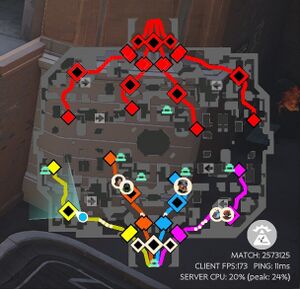Strategy: Difference between revisions
mNo edit summary |
mNo edit summary |
||
| Line 1: | Line 1: | ||
{{Stub}} | |||
'''Strategy''' in ''[[Deadlock]]'' is based on the game's unique [[mechanics]], focused on a combination of both third-person-shooter mechanics and MOBA gameplay. In the game's current state, many aspects of the game's strategy have been derived from high MMR play, tournaments, and knowledge from similar titles. | '''Strategy''' in ''[[Deadlock]]'' is based on the game's unique [[mechanics]], focused on a combination of both third-person-shooter mechanics and MOBA gameplay. In the game's current state, many aspects of the game's strategy have been derived from high MMR play, tournaments, and knowledge from similar titles. | ||
Revision as of 20:53, 28 August 2024

Strategy in Deadlock is based on the game's unique mechanics, focused on a combination of both third-person-shooter mechanics and MOBA gameplay. In the game's current state, many aspects of the game's strategy have been derived from high MMR play, tournaments, and knowledge from similar titles.
Laning

At the start of each round, players are assigned to 1 of 4 lanes randomly. Two lanes will be duo lanes and two will be solo lanes. The specific lane colors that are solo and duo are also randomly decided at the beginning of the match. Players are randomly placed, but duo parties are more likely to be queued into the same lane.
Support-centric characters like Ivy or Dynamo perform best in duo lanes with a high-DPS counterpart. Self-reliant characters with sustain or poke abilities, like Shiv, are better suited for the solo lanes. The random placement seems to account for this, though the exact mechanism is unclear.
Laning is strategically divided into three phases:
- Laning Phase (Early game): Players focus on winning their lane by managing troops, jungling, looking for easy kills, and gaining a soul advantage.
- Midgame: Sidelaners who have won their lane start roaming to assist midlaners, while all players continue farming objectives to strengthen their team’s position.
- Endgame: Players work to solidify their team's soul advantage, engage in most of the teamfights, and push to attack the enemy Patron.